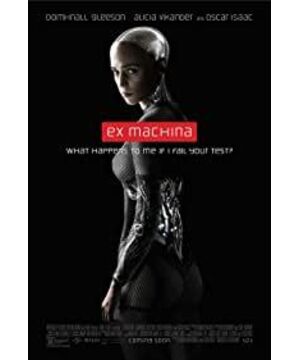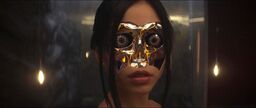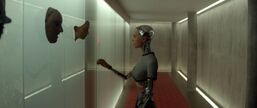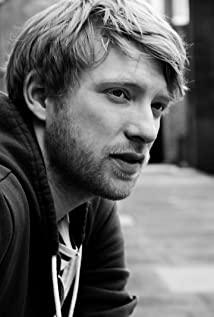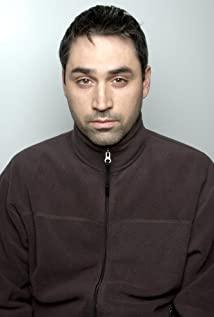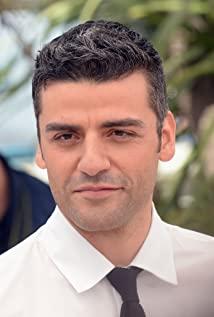These games you play
They're going to end in more than tears some day
Although this song only appeared for a while, I think this is the whole The true theme of the movie.
The second sign is the sudden appearance of morality.
Ava asked Caleb if you were a good person.
My heart was tight again. What is a good person? This is the first time a sense of morality has appeared in a movie.
When the whole story is over, I will revisit this clip, Caleb, why don’t you ask Ava, are you a good person?
People deceive each other, Ava may also deceive Caleb, but this question at least hints, as a human, how do you evaluate AI's behavior, ethics, and its principles. Unfortunately, Caleb completely ignored these. Gullible, stupid.
But it was Nathan who was even more stupid. Human nature is so hard to test, but you have to perform such a test in an extremely claustrophobic environment. This test is certainly a test for AI, but for the tester Caleb, why not also a test? When I was watching a movie, I kept thinking about Zimbardo's prison experiment. During the experiment, everyone gradually changed. He didn't do anything wrong, but he acquiesced in bad things happen. Nathan obviously saw Caleb's changes, but he didn't act accordingly. What a terrible experimental design.
The experiment is terrible and not just as simple as the above, because Nathan should know that for a successful AI, her purpose is to escape. And in his entire experiment, there was no emergency stop button controlled by him! This means that the whole situation is not controlled by him. He should know that one day he will face such a scenario, AI has matured, it will run away, attack, and deceive. If I set at least two final control
time bombs to destroy the AI
helicopter immediately , the pilot should understand who he should pick up, and if not, the pilot should know what to do (destroy the AI immediately).
This is a foolproof design. So I finally looked forward to the final reversal, which led to very dissatisfaction at the end.
These are complaints about the experimental design, but not a criticism of the movie. On the contrary, the plot inspired me to think about it. It can be said that it is a very beautiful and well-structured Sci-fi sketch. I can even imagine what it would be like if this story were written as a novel. A claustrophobic space, limited characters (three talking people plus one non-speaking Kyoko), guard against each other. Nathan left a hand to Ava (the video recorder, this paragraph is the most brilliant, and I didn’t expect it at all), Ava left a hand to Caleb (more than one hand), Caleb left a hand to Nathan (he shouldn’t be able to decipher the code so easily) Ah, unreasonable). However, Caleb did not give Ava a hand, and Nathan did not give Caleb a hand, so the whole structure broke.
The story fully exposed the weakness of stupid human beings. Nathan was stubborn, and if he could communicate with Caleb earlier, it might not have the heaviest ending at all. And Nathan lacks trust, so he is a big villa without a second living person (letting an emotional robot serve him, as expected, he will end up reaping the consequences). As for Caleb, he was extremely stupid, completely trusting without knowing anything about the other party, everything was counted in. And AI, in addition to not having the sense of morality that humans have, it is perfect. In the end, AVA's departure was like a ritual, the beauty of fear. And as I initially expected, the real detection of AI is definitely not planned by human beings in advance. The situation will get out of the hand! This is why I feel the need for ultimate control.
I don't want to say too much about morality, because it is difficult to define what morality is, especially in such a new context. However, murder should not be tolerated in any context. I admit that I had no liking for Nathan. As I said before, he was self-serving, indifferent and ruthless. But when he was killed, I felt very depressed. No one should be killed. AI, like the murderer in all detective novels, successfully staged a murder in the Blizzard Village mode. No matter how precise and perfect it is, it is still bloody. Since she is no longer a machine and passed the Turing test, then she is a murderer and should be tried instead of standing at a crossroad to observe. In this story, no one can judge her.
But if there were no such accidents, Nathan would destroy the AI, then from this perspective, how should morality define these behaviors? Did Nathan turn from a victim to a murderer? If AI does not pass the Turing test and she is still a machine, then this kind of destruction is not a murder, but if it passes, should she be treated differently? But as we have seen with our own eyes, what rules does AI follow? Can this law be called morality? Is it immoral just because it is not our law?
So I think the biggest inspiration from this movie lies in this moral dilemma. When designing AI, should we give her basic human morals? Once AI matures, she will change. It may be good or evil like AVA. Under such circumstances, is it more reasonable to judge them with human morality? After all, artificial intelligence is simulating human beings.
The second inspiration from the movie is observation. When AI asked Caleb, the camera was on the AI side, and we listened to Caleb's answer through the glass. What an obvious design, the observer becomes the observed:
you stand on the bridge and watch the scenery, and the
people watching the scenery look at you upstairs.
The bright moon decorates your windows, and
you decorate other people's dreams.
I only recently read the Man of the world by Frank O'cannon
http://www.newyorker.com/magazine/1956/07/28/the-man-of-the-world
"I could not have explained to him how at the moment everything had changed for me-how, beyond us, watching the young married couple from ambush, I had felt someone else, watching us, and we had at once ceased to be observers and become the observed, and the observed in such an ignominious position!"
This sentence reflects Bian Zhilin's poem and became the second inspiration for me from this movie.
Apart from these plot angles, what cannot be ignored is the artistic element of the film.
The minimalist style matches Pollock's paintings. This Nathan explained in detail in the plot, I think he really understands Pollock.
And another art that has not been stated is music. Since I started with Enola Gay, I ended with Geoff. The soundtrack of the movie is Geoff's work. No wonder it keeps giving me the feeling of Portishead! Think of their song Mysterons:
Inside you're pretending
Crimes have been swept aside
Somewhere where they can forget
Refuse to surrender
Strung out until ripped apart
Who dares, dares to condemn The
whole plot and art are perfectly combined.
I regret giving it to Samsung yesterday. According to my statement, I feel that it will be at least four and a half stars.
To add a new idea, what ava and kyoko are discussing can directly affect whether this movie can pass the Beckdel test!
View more about Ex Machina reviews


